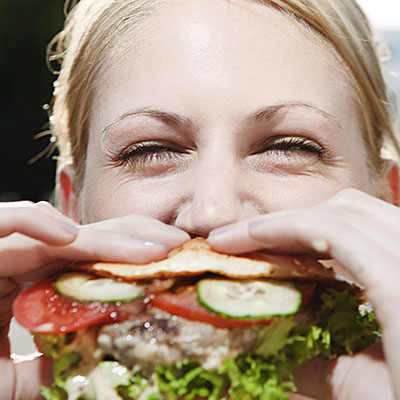Do you feel the uncontrollable urge to gorge yourself silly when the winter arrives? Is it the holidays or the temperature drop? Plenty of people says they eat more food in the winter than summer. But is it real? If so, why? If you think you can’t resist curling up with a steaming hot bowl of delicious food on a cold night, you are just not alone. Think of it as an extended holiday food coma!

Winter munchies – Why?
Amid winter we have less daylight. Therefore, your pineal gland responds to a lack of light by producing melatonin, the sleep hormone, that makes you feel sleepy as well as ready to rest. However, when you feel sleepy you lack motivation and energy. So, your activity levels may decrease. There is a possibility you may feel the cold more because the act of metabolizing food – that generates heat. As a result, your body will naturally crave foods that are rich in carbs to keep it warm. The higher level of melatonin can increases appetite as well.
Here, we round up a few theories — and offer tips to help you keep your eating on track.
Winter Blues or SAD
Few people suffer from SAD – Seasonal Affective Disorder amid the winter months that is a mild type of depression and it can also cause feelings of lethargy and sadness. Even if you do not suffer from SAD, the winter can affect your mood. So you may end up consuming simple carb foods to feel better. These foods not only will produce the hormone serotonin that will make you feel happy but also these foods can be a cause your blood sugar to spike rapidly and then drop even quickly, much like a rollercoaster!
We are COLD!
When our internal temperature drops, the body burns more calories in order to fight the cold. And our mind tells us to throw on an extra layer of clothing. Sometimes, yes, we grab a calorie-loaded hot drink or food such as double chocolate chip cookies. More easily than ever, the mindful eating goes right out of the window in our attempts to avoid the chills.
We are DEHYDRATED!
Well, believe it or not, we actually sweat as much in winter as we do in other seasons. Our bodies can easily become dehydrated because of the dry heat of radiators, overdressing as well as bundled layers of clothing. This can easily lead to overeating as our body’s response to dehydration is often confused with the feelings of hunger.
We are LAZY!
As most of us do whatever we can to avoid the cold outdoors, we are less likely to maintain our exercise routine. In general, we decrease movement. No matter it’s the shorter days, the colder temperatures, or the more forgiving appearance of our winter wardrobes, the tendency is to eat more. The less active we are, the more likely we’re to fill that gap in time with eating…a LOT!
Tips to avoid overeating amid Winter
Exercise and Exercise!

It stimulates your endorphin production, that helps relieve stress and also makes you feel better for many hours after. You’ll have more energy the entire day and your metabolism will stay elevated by helping you maintain your weight.
Omega 3 – The super food!

It has a plethora of health benefits. However, Omega 3 is crucial for brain health as well as its development. Consuming Omega 3 supplements can offer you a lot of health benefits. So make sure you obtain Omega 3 either through your diet or through the supplement for long-term health. Omega 3 rich foods are oily fish such as salmon, tuna, mackerel, and sardines, hemp seed oil, chia seeds, walnuts, and flaxseeds. There are also small amounts in leafy vegetables.
Say NO to processed foods

Processed foods such as white bread, rice as well as sugar not only lack the nutrients your body craves, but they also zap your energy levels. This ends up affecting your mood. Consuming more complex carbs like whole brown rice, wheat bread, vegetables, and fruit will provide your mind and body with nutrients and that will stabilize your blood sugar and energy levels.
Keep yourself HYDRATED

Our bodies are 60 to 70% water and we use water every time we eat, move, breathe and go to the toilet. So, maintaining hydration is really important for the proper functioning of our body and it is also important all year round. If you are not consuming enough water you will become dehydrated that can cause fatigue. You can also have green tea if you aren’t a great water drinker!
It is really a challenge to take control. But by staying active and watching your food intake you can avoid the extra calories that cause extra weight we tend to put on over the chilly winter months!

